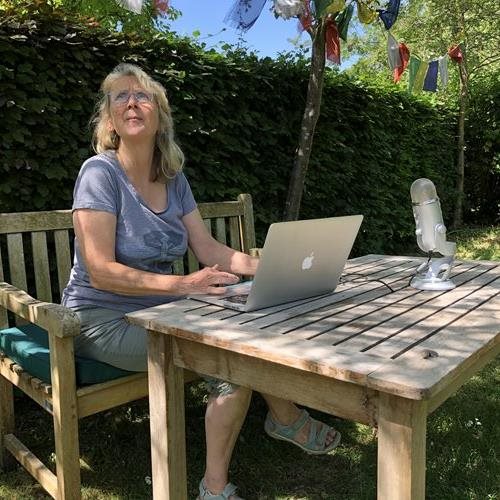It would take time, I thought, but the process would be straightforward. I could comfortably read 1500 words of my prose out loud in ten minutes so recording my whole 130,000-word, 374-page Nepal memoir as an audio book was doable. I thought this would take maybe more than a couple of hundred hours so was the prefect project for lockdown, and being in Nepal I could record exotic bird calls to start and end each chapter.
I plunged into the project with much encouragement and support from Simon and the boys but it took longer – a lot longer – than anticipated, unsurprisingly: I began in February and finally uploaded the completed recordings in early August. Once I’d mastered the software – designed for idiots, but still challenging for the likes of me – I found it took at least a day and a half to record and edit each chapter, and then of course some had to be re-recorded, or even re-re-re-recorded. I was further slowed down as I considered what minor changes and updates I should include. I resisted the temptation to do any major rewriting. I also pondered what to include in a new final chapter
There was so much to learn. I read that the voice changes through the day and that it was best to record at the same time each day, but what astonished me was how my voice changed even during a recording that might take an hour. This meant that cutting and pasting isn’t as easy as with the written word. And if “He said”, “She said” needed to be moved from the end to the beginning of a piece of dialogue, the intonation is completely different so you simply can’t.
And aware of criticisms of other author-recordists I put my heart and soul into this – no-one was going to accuse me of having a monotonous voice.
I did wonder what to do about accents. I completely marmalised reconstructed dialogue featuring Dr Green; this personable physician is Irish but my reading wandered back and forth across the Celtic Sea several times during a couple of lines. And my attempts at an American accent – well I just have to apologise, or hope listeners find it amusing.
I was aware that my attempts at Nepal accents could sound mocking. I hope this isn’t how listeners experience this.
Nepalis I meet often laugh at
my turn of phrase or poor pronunciation so I hope this also entertains and puts the listener into a Nepali frame of mind.
It was great to have been able to start recording
A Glimpse of Eternal Snows while in Kathmandu although I soon dropped my early ideas of recording while sitting up on our flat roof looking towards the
himals. The background sounds were not euphonic. Early on there were frequently aircraft overhead, there were motorbikes, but worse of all sounds of construction as repairs and new builds continue apace, post-earthquakes. Even though I recorded inside with windows closed, some listeners will hear distant voices, vehicles, dogs, cockerels and wild bird calls.
 |
| Distracted by bird visitors while audio-editing this summer (photo by Simon Howarth) |
I've written a little more on the audiobook (which eventually launched not early in August but in December 2020); my following post about the recording and editing process is available by clicking
The Fourth Incarnation
The link to listen to the book is here:
Glimpse audiobook